Eternals

Hieronymus Bosch, The Garden of Earthly Delights (circa 1490-1510)
"I feel a deep responsibility to maintain a sense of my own eternity."
As near as I can tell from here, we're each immortal until we're not. We each live infinite lives, lives within lives seemingly ad infinitum, right up to the moment when we don't anymore. To understand Eternals, it seems as though one must consider a slightly different from usual interpretation of infinity. Mathematics presumes infinity to be a collection of uncountable things, most often imagined as an overwhelmingly enormous set. They admit that some infinities extend further than others, giving rise to both smaller and larger enormities, but each extends further than anyone can imagine. Eternals last forever but emerge from moments. They hold realized potential and cannot ever be undone. That falling leaf embodies an eternal event which might have happened in many different ways, but didn't. It occurred just as it did and could thereafter never be undone. No do-overs, no mulligans. Each event happens precisely once, eternally.
You and I exist on the leading edge of an ever-changing eternity, for we each hold potentials destined to become Eternals.
Fallowtimes

Altichiero da Verona: Portrait of Francesco Petrarch, from a 1379 copy of the latter's De viris illustribus
"I've been cultivating dreams while inhabiting Fallowtimes since."
After giving and receiving the traditional Thanksgiving gratitudes, Fallowtimes settle in for an unimaginable duration. I might speak then in vague abstractions about last summer or a coming spring, but neither concept really settles in as likely or even distantly possible. A chrysalis too-securely covers my senses. My gardens, past and future, dominate my dreams and even some of my waking times then, for of all my friends, my gardens have seemed both the most dependent as well as the most dependable. Some I feel certain will never return. A few might resurrect, though likely in different forms, but I remember the placements, where the Bleeding Hearts sprouted each spring and where the buttonweeds grew the fiercest. I came to deeply understand each habit and habitat, each frustrating tendency and each payout. I freely submitted myself to their well-being, even when doing so would take too much out of me, for they represented a greater good, an association within which I could feel genuinely proud without ever experiencing a threatening pridefulness. I merely dug dirt.
The dilemma Fallowtimes present centers around to what I might satisfyingly relent, for an existence must, in my estimation, submit to something.
Transpacities

Johannes Moreelse: Clio: Muse of History, c. 1634
" … we recognize who fooled who, and recoil."
I feel fortunate to be able to report that I've only been taken mean advantage of a few times in my life so far. I might have avoided each instance, I later reflected, had I paid closer attention not to the villain but to myself, for I came to realize that I'd known I'd been offered a rubber worm before I'd decided to sink my teeth into it. I was probably just needer than I had suspected and so too easily ignored the clear and present felt sense that the villain was not to be trusted. I had successfully fooled myself, for my mountebanks had each very clearly exhibited Transpacities, those cues that a phony transparency's before me, in everything they'd said and done. They couldn't help it. They'd each offered some form of instant intimacy, an authentic impossibility, but in my then present state of neediness, I'd ignored the cue. We're each capable of doing this to ourselves.
Some believe that people are always trying to cloak who they really are and what they're really up to.
Beyond

Edvard Munch: "Selvportrett" (1886)
"We'll likely look back with both nostalgia and regret."
I suspect that my many years interacting with computers have entrained me into certain preconscious habits. My computer, however outwardly benevolent, operates strictly within a very narrow range of permissible patterns. I must, for instance, open, edit, save, and recover according to certain procedures, some of which initially baffled me but which later became second nature. I've found several applications unusable because they seemed to expect me to think and react in ways I could not intuit or consistently remember. Some applications, I need to relearn each time I use them. I have many which I tried to use once and then never went back, finding nothing compelling in them after my initial investigation. A friend posted one of her grandmother's recipes and I felt shaken for just how un-Boolean it was. It violated what I've come to understand constitutes normal. One had to read it clear through at least once to understand that, for instance, it was not written in the preparation sequence, a gross violation of more thoroughly-ingrained modern practice. I began considering what forms of structure might lie Beyond the ones we have grown to use today.
It wasn't until the 1930s that anybody had developed a logical structure simple, spare, yet complete enough to support anything like a consistent machine language, one capable of mechanically replicating complex calculations.
ThanksReceiving
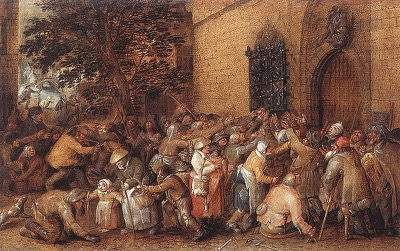
David Vinckboons: Distribution of Loaves to the Poor (first half of 17th century)
"I suspect that most of us could use some practice."
It might be a law of the universe that for every thanks given, one must be received, and while on Thanksgiving Day, one might sincerely offer many thanks, few ever mention the target receivers of these thanks. In this culture, most of us receive instruction in the practice of ThanksGiving, which seems a central tenet of human decency here, few receive much training in the congruent reception of those thanks. Was it Jesus who insisted that it's better to give than receive? We might have taken that directive a little too close to heart, for it's certainly not, then, damning to receive rather than to give, though many of us seem to respond to an act of giving as if it was somehow shameful to receive. We might blush and find ourselves suddenly tongue-tied, and simply nod as if to dismiss this backend of the ritual. A giver, appreciated for providing, might even catch himself mumbling, "It was nothing," thereby boogering up an otherwise uplifting exchange. But where to go to receive this essential training in ThanksReceiving?
This practice might belong to that class of practices one can only ever teach them self.
badream

Antonio de Pereda: The Knight's Dream (ca. 1650-1670)
On the banner: Aeterne pungit, cito volat et occidit.
"Eternally it stings, swiftly it flies and it kills."
" … not ever what they're not actually saying."
I dream in allegory, not coherent narrative. When The Muse asks what I dreamed, I'm speechless because I cannot translate them into words. They mostly seem absurd, haphazardly combining metaphors. I think of them as badreams (pronounced BAdreams) because they unsettle me and chase me away from sleep. Several times each week, I find myself awake, hesitant to close my eyes again, feeling not quite finished with sleep but effectively barred from reentering it. Each badream brings some message but these might just as well have been sealed within a bottle within a box and sunk deeply beneath the sea for all the coherence they seem to carry. They communicate anyway, beyond words, beyond any coherent in this world. Meanings seem to seep in and they often refuse to go away. Perhaps they carry significant information or maybe they're just distractions, synapses firing randomly to produce profound sensations signifying nothing. How could I know?
They often seem to carry warnings.
SecularHolidays

J.C Leyendecker: "Thanksgiving" [American Weekly cover art] (1940)
"SecularHolidays seem to be all about the food and remembering to say grace."
The founding American principle separating church and state might have quite naturally necessitated the creation and observance of not higher holy days, but secular ones. Visit Italy and you're likely to feel surprised when you find a bank closed on a Monday to observe some obscure, previously unknown to you, holy day of obligation. No worry about that happening here, except by rather accidental coincidence. Christmas, probably the pre-eminent SecularHoliday in the Ewww Ess of A, happens to share a day with several prominent sporting events and a rather mammon-rich exchange of what are referred to as gifts but often amount to payoffs, vigorish in a vigorous competition. On Ash Wednesday, Catholics can be spotted walking around wearing ashy crosses smeared on their foreheads, and that might turn a head or two, but on Halloween, otherwise respectable supermarket checkers show up for work decked out in the most outrageously ghoulish get-ups, and nobody turns a head. It's understood that it's a SecularHoliday, and everybody gets a pass.
Thanksgiving seems the most curious one, a SecularHoliday dedicated to gorging and recreating family trances.
PersonalResponsibility
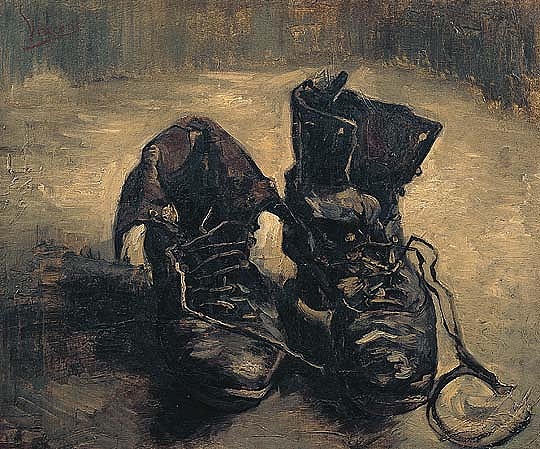
Vincent van Gogh: Pair of Shoes (1895)
"We'll be a very long time absorbing this lesson and recovering."
PersonalResponsibility will ultimately prove to have been the greatest failure during This Damned Pandemic. Governors, mayors, and other well-intended authority figures deflected pleas to take firm stands by directing The Public to wear masks, avoid clustering, and simply stay at home. Some insisted that it was these public figures' duty to mandate certain behaviors in order to stem the flood of infections. The more conservative responded by rejecting these assertions that their duty lay in implementing what they insisted were fundamentally unenforceable rules, insisting that individuals rightly held the PersonalResponsibility to, as they repeatedly said, "do the right thing," whatever that might become. As a result, several interpretations of right thing emerged, each presumed true by whomever held it. Some refused to mask themselves, for a variety of curious reasons, potential suffocation a common if utterly spurious explanation. Some even became militant at the suggestion that their PersonalResponsibility might extend any further than their own, apparently holy, me, me, and me. The result, of course, became a rather shameful and utterly ineffective act of Collective Irresponsibility, as each adhered to their own conscience rather than what might prove collectively effective. We produced together a large-scale Tragedy of the Commons, where what's individually perceived as best for me, inevitably becomes the very worst for everybody.
History might perceive this troubling paradox, and even a majority see it in real time, but unless everybody buys into mitigation, the outcome's inexorable, for stemming this infection was not merely a matter of PersonalResponsibility, but a collective one.
ThreateningToFester
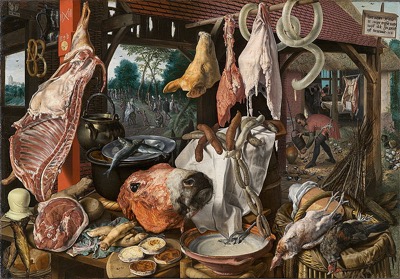
Pieter Aertsen: A Meat Stall with the Holy Family Giving Alms (1551)
" … something different will most certainly be ThreateningToFester in my curious larder."
I overstate my case, but only by a little, when I say that I use the same recipe for everything I make in the kitchen. I use a variety of ingredients, not the same ones again and again, but the ingredients for my best stuff share a common state in that they're all ThreateningToFester. I'm not above scraping off a bloom of non-intrusive mold, but most components haven't degraded quite that far yet, though they could easily pass over within the next couple of days. I maintain what I think of as a deep larder. It features plenty of variety and I refresh it more or less continuously. I preserve compulsively, always pressure canning something for later use. We tend to over-buy fresh veg and fruit. Mangoes tend to get away from us and need some surgery before using. Lettuces might turn a little brown, or even inky black around the edges before their turn comes up in rotation. I trim the worst, saving those trimmings in the freezer for a later stock pot, and all's right with our world again. Cilantro almost always manages to completely go to the dark side before I find it as an inky mess in the bottom of the Black Hole veg drawer, but that's an inconsequential loss.
My best suppers combine in some unexpected way leftovers from three or four previous suppers.
GroanUpAgain
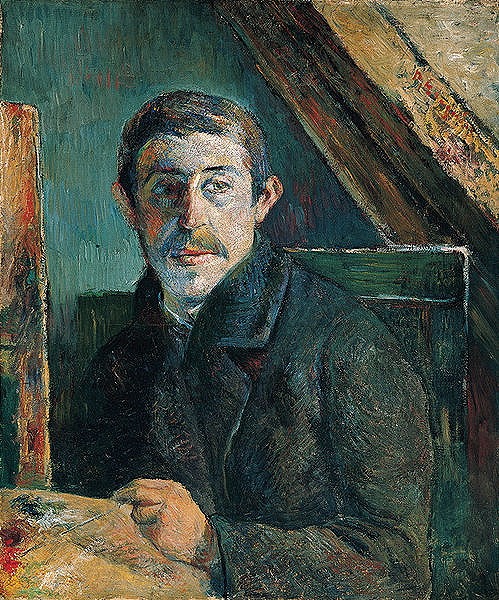
Paul Gauguin: Self-Portrait (1885)
"They left me behind to carry on something."
As near as I can tell from here, I'm still growing up. I doubt that I'll ever finish or even make all that much headway. It might have been youthful fancy that once convinced me that I might one day mature, and that it might prove to be a cure for what plagued me in my youth. I imagined that my native indecisiveness might one day grow into clear convictions, but that hasn't happened yet. I'd thought that experience might buy me a certain tranquility in the face of fierce uncertainty, but I'm still struggling with that koan. The very notion that evolution might apply to my own little micro-climate now seems absurd, for while I'm not precisely who I started out as, I'm remarkably unchanged after passing through this veil, perhaps myself now, only more so. Somehow, everyone else seems matured. My classmates became beyond middle age to more closely resemble their parents, I still feel exempted, except when my mirror lies to me, which it conspires to do daily. I know more but feel no smarter. I've many times been there and back again, but retain a similar curiosity as I held at the beginning, as if those excursions hadn't quite taken. Each morning seems new all over again, undiscovered like a familiar toy I'd lost then found, certain to lose again.
I accept just how ineptly I've overcome my challenges and yet I still managed to overcome them.
WillingSuspension
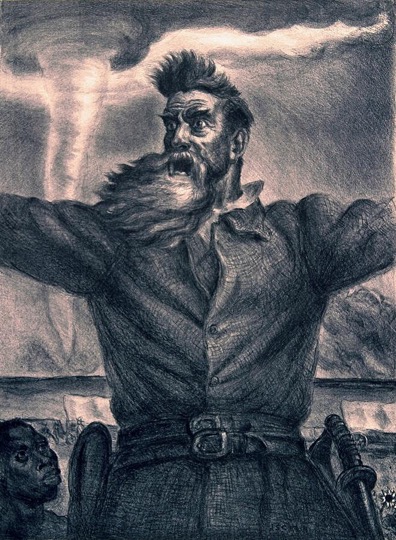
John Steuart Curry: John Brown (1939)
" … maybe we won't miss much of what we edit out for the purpose of improving the quality of our experience here."
The poet Samuel Taylor Coleridge is said to have coined the term WillingSuspension of Disbelief when trying (and probably failing) to explain how a reader should approach his work. Poetry's like a joke. If you have to explain it, it didn't work. I believe that he probably meant that The Rhyme of the Ancient Mariner should be read as a figurative rather than literal work; he didn't intend it to mean what it said but what it invoked. Most literature seems improved by reading with a fuzzy eye, not parsing it for too many facts, but perhaps for insights instead. Facts piled upon each other quickly become almost as interesting to read as a standard dictionary, plot line uninspiring. Theater, film, even television fail if perceived through any overly-critical eyes, for they rely upon a kind of conspiring with their audience, a tacit understanding that they won't mention the odd shadow the stage set casts or the obvious fact that no Martian would ever actually say THAT. We're pretending for some larger purpose, often, our own amusement. Of course the kids' improvisational after-dinner performance is lame. Parse for cuteness instead.
Following up on my yesterday's story, Disbelief, I spent my post-writing day considering Disbelief's accomplice, WillingSuspension.
DisBelieving
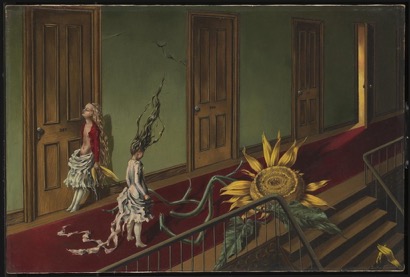
Dorothea Tanning: Eine Kleine Nachtmusik (1943)
I was never a believer in The War on Terror. Its premise seemed fatally flawed from the beginning. While it's true that in every war so far, neither side had the slightest idea what it was doing, The War On Terror lacked even a tangible identity for any enemy combatant. It was as it was conceived to be, a Whack A Mole® undertaking destined to string us along for an eternity or longer. The only possible way to win such a war entailed refusing to engage in it. Once deployed, no exit could possibly present itself, except to just withdraw from it, though such a retreat would necessarily bring into sharp relief the underlying fallacies behind it. We stay engaged to save face, I guess, further sullying our reputation for the purpose of preserving our self-esteem.
When I was a kid, I often wondered what it would have been like to live through a war.
AbSense

Caspar David Friedrich: Two Men Contemplating the Moon (Circa 1825-30)
"I'd graduated from and into my self …"
If absence makes the heart grow fonder, I must have the fondest heart. Much of my life (so far) has prominently featured absences, usually, my own. Making sense of these distances presents a challenge, since sense-making seems sort of a team sport. Solo sense-making lacks a requisite variety and tends to reverberate more than reveal. Most of my professional life, emphasis has been placed upon teaming, with little notice of its necessary individual component, where work's actually accomplished, in AbSense of everyone else. Few things seem sorrier than team members struggling to find their identity together, when each might have brought their own personally-crafted identity from home to hook up with each other's. That homework easily gets shirked in favor of some diversion, something (ANYTHING!) to pull the disquieting attention away from self. I remain uncertain what sort of training might prove useful for developing a deepening sense of that self, the one unavoidably separated from everyone else. Maybe training couldn't help. Perhaps it's just the kind of swimming that requires innocents falling in over their heads and then figuring it out by themselves.
Separated from the mothership at birth, the separations continued afterward.
ReNial

Diego Rivera: El Hombre in Cruce de Caminos (1934)
"What are we supposed to do with this?"
If denial remains the first stage of acceptance, ReNial attempts to infinitely extend irresolution. It's a cognitive state probably intended to keep the true believer safe, though it eventually backfires in practice to insist upon ever-increasing personal peril. When one falls into ReNial, no evidence qualifies as sufficient to counter any initial misconception. First impressions metastasize into permanent, ever more strongly defended, convictions. Those in ReNial seem to perceive admission of even a small mistake as an irreversible negation of self, a forfeiture of some essential part of their own identity. They persist in believing even obviously self-destructive falsehoods long after what most consider reasonable. They come to not simply resist acknowledging some obvious something, but eventually identify themselves as resistance itself. They thereby back into assuming a negative identity defined by what it denies. Negative identities tend to reliably produce the opposite of whatever they want.
Society long ago adopted forms of logic intended to help us prevent falling into ReNial.
Wreading

Berthe Morisot - Reading [La Lecture] (1888)
"Nobody needs to care where my writing comes from except for me."
Writers Wread much more than they write. We do not merely read, but Wread, which is the specialized kind of reading in which writers engage. We Wread compulsively, like we might breathe if on the edge of suffocation, a necessity much more than a choice. UnWread books sit like spare oxygen tanks on my side table. My piles of New Yorkers, emergency secret stashes should my books fail me. I won't read just anything, at least not to conclusion. I'm likely to try anything. I hold high but unexplainable standards for what constitutes Wreadable, and quickly discard anything striking me as incoherent. I'm particular because, like many writers, my writing seems to echo whatever I'm Wreading, echoes not being true reproductions, but similar resonances. I do not aspire to write like anyone else. Should I start Wreading something that does not sing to me, I dare not absorb its discordance, lest it leak back out in my writing and into my reader's ear.
I Wread for joy, to immerse myself in a writer's voice, to revel in clear and clever usage.
PandemicPete

This illustration appeared in 1909 in The New York American
"Go ahead, just shoot the messenger and try hard to avoid hitting your own left foot in the process …"
Nobody felt more wrongly accused than Mary Mallon, Immigrant Irish Cook for a wealthy New York banker's family vacationing in Oyster Bay. She felt fine and refused to cooperate with the investigator trying to track down the source of an unusual typhoid outbreak among the elite. Typhoid most often appeared in slums. Typhoid Mary was eventually quarantined for the rest of her life and felt wrongly persecuted for every minute of that time. Now infamous, we might imagine that Mary deserved her infamy, that she was particularly cavalier or callously cynical, but she was neither, just unaware, in the modern vernacular: merely clueless. SARS-CoV-2, The virus that causes COVID-19 infections, cannot be properly characterized as cavalier or cynical, either, neither can those who spread it unaware, a designation which might reasonably include anyone and everyone, since SARS-CoV-2 seems to primarily spread using Typhoid Mary's insidious method, via the asymptomatically infected. The Pandemic Petes exclusively responsible for spreading This Damned Pandemic might have each done what Mary did, unsuccessfully sue the health department for quarantining them, but might reasonably feel wrongly accused of what they do, what they each did in turn. They didn't know. I write this piece so that we might come to know together.
We have a long and overly proud tradition of shooting messengers, blaming informants for delivering unsettling content.
WhyIAmNotACapitalist

Pieter Aertsen: Market Scene (1550)
"It might be that only those unable to play gain anything."
I considered myself a non-combatant in the great twentieth century dichotomy between capitalism and communism. I chose Neither Of The Above, because I thought the distinction phony. This choice probably complicated my life. I was born into a self-proclaimed capitalist nation and I didn't profess fealty to the national religion. I wasn't so much opposed to others practicing it, within reasonable limits—nobody likes a glutton—, I just couldn't find traction for myself within it. Becoming a capitalist required that I accumulate some capital, or borrow some, in order to participate, and I never figured out how to satisfy this fundamental qualification. Some seemed to find employment that paid them more than they needed to live, but I never did, so capitalism held zero attraction. Capitalism always seemed like something other people did. Oh, I've purchased stock a couple of times in my life, but I always quickly disposed of it, feeling exposed as long as I held it. I'm more of a sock-drawer sort of investor.
I prefer to hold cash and advance myself by not spending it.
SelfEvidence
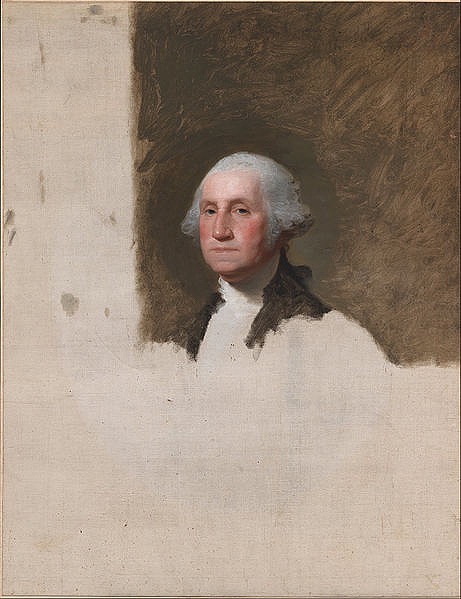
Gilbert Stuart: George Washington [The Athenaeum Portrait] (April 12, 1796)
"Maybe SelfEvidence inevitably insists upon regulation."
The Father of Our Country, George Washington, never fathered a child. I suppose that he was too busy fathering the country to get around to attending to his wife's procreation needs, or he might have been one of those futuristic types who could not quite justify contributing to eventual population explosion. The country he fathered was the only one predicated upon SelfEvidence. Also, his most recognizable portrait was never finished. These two facts might be related. The Declaration of Independence, a rather petulant document, insisted upon Self Evident Rights, ones requiring no independent evidence to prove their existence, a then unprecedented proposition. It left the infant country in a curious position, independent in unproven ways and decidedly headstrong, for it had created a conjured foundation, one lacking confirmation within the then-existing common law governing any nation. How might one go about translating this notion into practical governance, if mere propositions underpin the nation? This would prove to become the underlying question for the maturing country. It fueled truly terrible teen years which rent it in two, and a difficult early adulthood which went to its head. It encouraged diversity while endlessly punishing its presence. I think I can say without much fear of contradiction, that the nation, so constituted, became a skitzy mess.
I ascribe the resulting chaos to that founding principle of SelfEvidence, which encourages a certain Know It When I See It sense, which often manages to make little sense at all to someone else.
TroubleBubbles

Jean-Michel Basquiat: Flexible (1984)
"Oh, the stories they'll tell later!"
My friend Franklin's son Bodie is a freshman in high school this plague year. Bodie's a smart kid, so I'm convinced he'll experience only the normal academic encumbrances, but I wonder how he'll manage to become an adult without the freedom to experience adolescence's usual and necessary dalliances. Playing hooky's probably out of the question. How will he be able to develop even a half-decent addiction to anything he'll later have to recover from if he's not out and about unrestricted by lockdowns? Will he even have access to the usual reprobates every kid tries to relate to for a time? How will he disappoint his mother if he's just home in bed every blessed night after supper? Will Franklin have to serve as his sole bad influence? I believe that nobody gets to become an adult without making more than a scant few serious mistakes, some potentially life-threatening. Teens live intensely and learn rather begrudgingly before building their lives on top of the catastrophe they construct for themselves. How can they accomplish this critical work if they're home with their family each night?
Dates seem impossible while every possible venue's in lockdown.
Airgknowrance

Mr. Toad, Illustration by E.H. Shepard from The Wind in the Willows by Kenneth Grahame (1908)
" … every action seems somehow destined to produce some greater wisdom if we can only pay attention."
Have you noticed how arrogance always seems to accompany ignorance? The most insistent seem to turn out to be the most consistently wrong. The soft-spoken, ain't jokin', while bluster seems to be trying to muster more acceptance as if it could not possibly stand on its own. It almost never can, and the bluster rarely helps longer term. A tangible humility accompanies most truth, for it seems to have nothing further to prove. It walks both softly and without carrying around any over-sized stick. In spite of this fact, some always seem to attempt to successfully argue at annoying volume, perhaps compensating for an absence of veracity with distracting noise, as if few would notice the naked emperor before them. Besides rendering themselves annoying, they quickly become boring and eminently ignorable, just so much irrelevant static. They can, however, attract teeming legions of the ignorant, people perfectly willing to, for instance, take up arms to defend utterly fictional rights and privileges. These people seem genuinely dangerous.
Napoleon noticed that if he gave any decent man a red banner and a uniform, he would quickly become a soldier, and willingly die for abstract concepts like God or country, liberty or fraternity, without ever asking for supporting definitions.
SnowDaying

Adriaen Brouwer: Youth Making a Face (c1632/1635)
" … holding me closer than I care to be held."
The cats remain small children, approaching eight or nine human years old, only a year and a half in cat years. They remain the centers of their worlds with whole universes existing solely to service their whims. They haven't yet heard about manners. Max wants outside when he wants to go outside, and denying his demand leaves him mournfully yowling. It's cold outside this morning, though, and he has not yet learned to respect the cold. I suspect that he imagines his late summer predawn awaiting him. He looks as if I've betrayed him when the door opens to snowing. He steps out as if into water, slinking off into shadows. He quickly returns, complaining as he enters, seemingly pleading for me to restore regular order. Molly seems more mature in that she might no more than step out into it before appreciatively returning inside, resigned. Neither seem to want to be inside through the morning. They take to their corners to dream, I suspect, of the mice they expected to be hunting. This day will continue forever.
Nothing like weather to spark the unrequitable urge to go somewhere, anywhere.
FiguringOut

Edvard Munch: Dance Of Life (1899 - 1900)
"May I never finally figure it out."
I write because I'm still FiguringOut how to write. I cannot remember the elementary school lesson that disclosed this apparently fundamental aspect of living, that one might learn without ever finally resolving learning, the tenaciously asymptotic aspect of life. I can't remember that lesson because I never received it. Each learning iteration might well advance the cause without resolving the struggle. Another deficit always emerges to render the learning incomplete. It might be that mastery emerges only after this understanding overtakes more naive notions, when the trajectory finally becomes clear. Nobody ever actually arrives there, though the pursuit remains worth engaging, just as one remains worthy of engaging by continuing. The purpose of FiguringOut must not be to finally figure out, for FiguringOut only exists in irresolution. Should anyone finally figure out anything, they should properly cease further learning. Then what? Become some font of knowing, a cold stone artifact of known? The world seems to continue changing, indifferent to such presumed achievements.
Maybe simple entropy explains this feature, where each advancement furthers without resolving.
InFLUencing
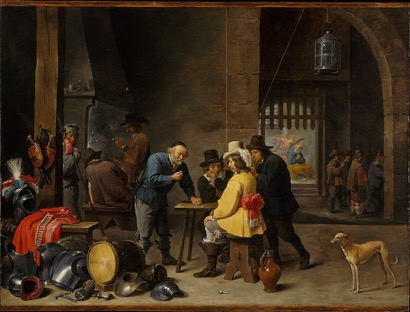
David Teniers the Younger: Guardroom with the Deliverance of Saint Peter (ca. 1645–47)
"Why would I chose to live any other way?"
The Lord reportedly works in mysterious ways, but no more mysteriously than any of the rest of us. I, for instance, rarely sense that I might be inFLUencing anyone, though I suspect that my inFLUence extends much further than I comprehend. It might be that every action, every thought, spreads virally, or virus-like, which is to say insidiously and invisibly. My casual aside might arrive like a missing puzzle piece for some anonymous anyone barely within ear shot, utterly unbeknownst to me. I feel nothing when another receives something I've sent unawares. They feel nothing when they've inFluenced me. We play a Blind Man's Bluff without deliberately bluffing, for this seems to be the stuff of human interaction. We're each incapable of inaction, for we seem to be continually InFLUencing whatever we do, even we firmly believe that we're doing nothing at all.
Know that whenever you show up and however you appear, you're actually InFLUencing there.
Grudgy

Jan van Noordt: Juno confiding Io to Argus (circa 1660-1670
"The Grudgy seem dedicated to continually unflushing toilets, a service nobody really wants or needs."
Grudgy lies near the top of the heap of the more unseemly human responses. Sore losers seem most like losers to their core, boring drinking buddies, and terrible neighbors. They cannot seem to do anything but remember that sleight, that indignity, that otherwise minor loss more properly relegated to humbling forgetfulness. It becomes their oeuvre instead, their sole identifying trait. They're the ones who never forgate and forevermore shoved their sorriest episode before them to announce their presence. Most wisely slip aside to hide until they pass by. The few friends they end up with feed like carrion birds on this sorry story they've heard so many times, in all its many variations, that they could recite it backwards. They seem to need an opponent, someone eternally out to get them, to feel complete. They shamelessly bleat.
I'm not above the occasional dabble in pouting.
Can'ticipation

Francisco Goya: (Átropos/Las Parcas), Atropos (The Fates), 1819–1823
"A Can'ticipated catastrophe seems somewhat averted."
Election night brought a waking nightmare, a scare effectively warding off sleep and leaving a rare but familiar sense of foreboding, as if The Fates had found me and were in the process of stealing any remaining self-determination still available to me. I might have set myself up, knowing that I'd optimistically entered the election, what any pessimist would agree might certainly poison any expectation. I watched myself cycle through the three stages of despair: Want To, Need To, But Can't, a condition I might label Can'ticipation. The resulting sense of desperation seems absolutely inescapable, and tends to arrive at what certainly feels like the most inconvenient possible time. I felt utterly unprepared for a fresh round of coping and felt that I even deserved some sort of reward, or at least some recognition, for my the hopefulness and dedication I'd exhibited through an overlong campaign season during The Damned Pandemic. I felt very near the end of anybody's rope and could not afford to imagine that I might have to muster even greater coping skills than I could remember ever mustering before. I spent that long night terrified of the apparently inevitable.
I swore off all news coverage, not wanting to know what I already so deeply felt.
Domesticity
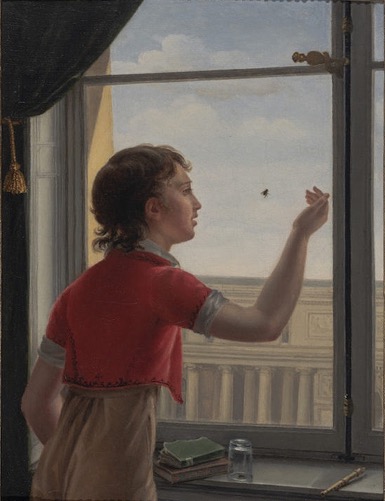
Isabelle Pinson: The Fly Catcher (1808)
"We're learning that Molly's actually in charge …"
Molly The Kitten arrived here a year ago, just over six months old, after we'd successfully shanghaied her from the cat shelter. I had taken responsibility for interviewing her to determine suitability. We knew she was Max's sister, and we would have taken her when we'd nabbed Max a few weeks before, except she was still recovering from several diseases common to ferals, so we'd decided to wait until she'd recovered. They'd given her the humiliating name Parfait, I suppose because her coat features swirls of contrasting color. She was not then anybody's cuddly sort of kitty. She cowered in the corner of her cage and flew into a shredding rage when I tried to scratch her head. I finally managed to pick her up and sort of sit her on my lap by wrapping her in a towel, fresh gouges weeping blood from my offending hand. She glowered in the absolute antithesis of appreciation. She seemed like she might eventually tame just fine, though that sense might have been my arrogance talking. She came home with us and began what would become a year-long keep away game. She's still only somewhat tame.
In the last week, she's finally consenting to allowing me to touch her without me first bribing her with treats.
Liedentity
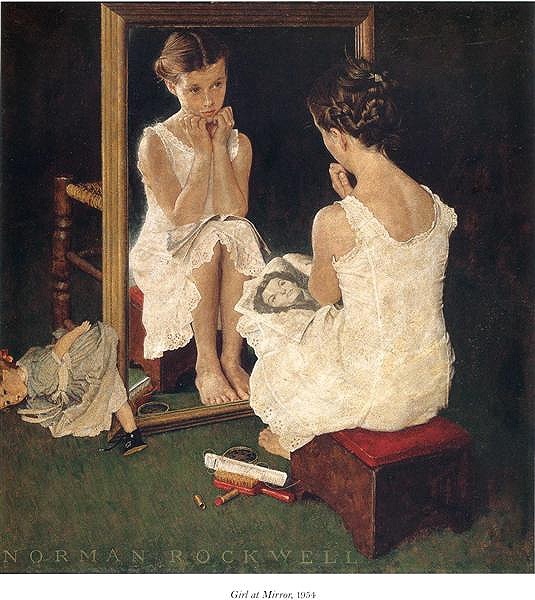
Norman Rockwell: Girl at Mirror (1954)
"If you really want to know my identity, just get in line behind me."
Excuse me, please, for even bringing up this topic, but I seem to be experiencing an identity crisis. I, perhaps naively, believed that my identity was mine, a deeply personal characteristic I shared with nobody else. It might seem similar to others' without mapping one to one, a one-of-a-kind. I'm coming to recognize that discovering my underlying identity might serve as a pillar of personal enlightenment. Describing it might prove impossible but attempting to describe it might prove a useful medium for actual self expression, and a necessary one. I might achieve nothing more than rough approximations of descriptions and still satisfy myself, even others, that I was coming to really know myself: who I was, who I am. But recently, identity seems to have turned into something else, a perspective almost exclusively turned away from self and toward somebody else. Identify might have become the replacement meaning of identity, where I exclusively seek myself in somebody else.
Identity Politics seems founded upon the principle that self belongs to collective associations, that the source of identity just might reside within relations with others.
TimeBubbles

Jacob Lawrence, Street to Mbari (1964)
" …by then it will have become irreparably past."
Einstein concluded that time moved inexorably forward, never backward, though its substance eluded him. Unlike other elements of his physics, time stood off to one side, never discretely discernible, but also essential. His calculations couldn't work without its shadowy presence. Clocks from sundials to mechanicals seem to materially misrepresent time's nature, for while it doubtless does only move forward, it does so less regularly than popularly represented. It seems to move in fits and starts, seemingly sticking some places for periods ranging from hours to decades. The basic unit of measure for the human experience of time's passing might be labeled The Period, in homage to both its tenacious indeterminacy and also for its inevitable termanancy. Periods last for 'a while,' and tend to end with often shocking banality. Once they're over, they're over forever.
I think of time as existing in TimeBubbles.
MillionDollarDream

François Boucher: Sleeping Shepherd (Circa 1750)
"Whether that dream ever attracts a million bucks could never have been the point …"
Though a million bucks certainly ain't what it used to be, it remains a considerable chunk of change, and while I've never possessed that magnitude of personal wealth, I have been the beneficiary of several MillionDollarDreams. The absolute magic of a MillionDollarDream seems to be that it need not produce a million actual dollars to manifest its true purpose. Some who pursue their MillionDollarDreams do, indeed, attract significant financial gain, but even those whose pursuits never realize financial profit, still benefit enormously from their engagement, for a MillionDollarDream seems to impart a kind of gold plating to whomever maintains them. Each MillionDollarDream starts as a rather wild idea, one with perhaps no obvious chance of ever coming to any sort of actual fruition, like the notion that you and a few friends might, in a scant week's time, transform a dusty old barn into a successful summer stock theater and produce a hit show capable of launching everyone involved into stardom. The resulting flurry of activity might be best characterized as absolute parody, but for those involved, it likely becomes a peak life experience worth at least a million bucks. That's a MillionDollarDream!
My MillionDollarDreams were each capable of goading me into investing a million dollars into them, though I at no time ever held that kind of line of credit.
Voicing

Leopoldo Metlicovitz, poster for Puccini’s Gianni Schicchi (1919)
"It might be that every authentic Voice sounds phony to itself …"
The first time I heard a recording of my voice, I felt embarrassed. I feared that the abomination I'd just heard had been a faithful reproduction of the tone and timbre everyone had always heard emanating from my pie hole. I felt appalled that I might have, completely unbeknownst to me, always sounded like … like … like THAT! And so I received my first great injection of self-consciousness, a virus, I suspect, and one from which I might never recover. From there emerged an inhibiting shyness on stages I formerly simply possessed. I could not hear that queerness when speaking or singing to myself, for some acoustical quirk spoiled fidelity, though my Voice sounded much better to me than that recording had sounded. I took to practicing in tightly enclosed spaces, bathrooms and closets, in hopes of better hearing how I actually sounded. I never lost that unwelcome awareness that I had never known how others heard my Voice.
I don't sing so much anymore.


